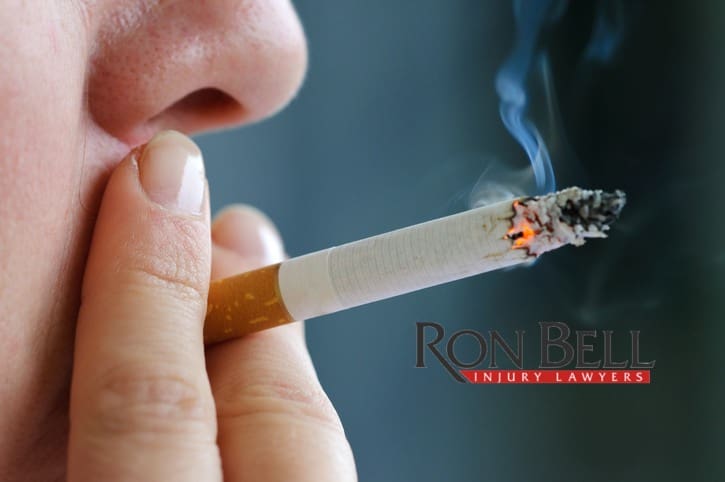
New Year’s Resolution Series – Quit Smoking
February 9, 2018
At Ron Bell Injury Lawyers, we are dedicating the first of the new year to resolutions that we hope our readers and clients will consider adopting. Each of these blogs will target a suggested resolution for a safer, healthier and personal injury free 2018.
For this week’s blog, we will focus on the resolve to give up smoking.
Resolve to Quit Smoking
Seven out of ten American smokers want to quit, and it’s one of the most popular New Year’s resolutions every year. The damage that smoking causes are no longer shocking, or unknown. Most children are taught it at a young age and throughout the entirety of their high school education. This has seen positive results. An L.A. Times story reported a huge drop in teen smoking through 2017. 74.9% of the 12th-grade students surveyed from around the U.S. said that they thought “it was dangerous to smoke a pack of cigarettes a day, and 86.6% said they disapprove of a daily smoking habit.”
Personal injury lawyers across the U.S. have also been gaining headlines for lawsuits against tobacco companies. There are also a number of secondhand smoke lawsuits against individuals that expose victims to the secondhand smoke blamed for their health conditions. It’s believed that 38,000 people die each year from secondhand smoke, that is, tobacco smoke that’s exhaled by smokers and then involuntarily inhaled by other people.
Smoking and Healthcare Costs
Apart from the staggering one in five U.S. deaths blamed on smoking, the costs of the habit are also large.
“Over 400,000 people die prematurely each year due to tobacco-related illnesses. In fact, tobacco use results in more deaths each year in the U.S. than AIDS, alcohol, cocaine, heroin, homicide, suicide, motor vehicle crashes and fires combined,” a U.S. Treasury study said.
The same study reported tobacco use “may result in excess medical expenditures of nearly $60 billion today. Public funding – primarily Medicare and Medicaid – paid over 40 percent of those costs, or more than $20 billion.
For a young person, smoking was estimated to cost about $13,700 extra in medical costs compared to someone who doesn’t smoke.
Smoking and Health Recovery
For our clients, one common concern is getting back to their normal life after a personal injury accident that required surgery. Doctors have linked smoking to a higher incidence of post-surgery complications and they often recommend that the patient quit ahead of surgery.
The American Society of Anesthesiologists is one such proponent.
“The earlier you quit, the greater your chances are of avoiding surgery-related complications. It is especially important not to smoke on the day of your surgery,” they said. “Fortunately, the body begins to heal within hours of quitting. Twelve hours after a person quits, his or her heart and lungs already begin to function better as nicotine and carbon monoxide levels drop. It takes less than a day for blood flow to improve, which reduces the likelihood of post-operative complications. We recommend patients abstain from smoking for as long as possible before and after surgery, but even quitting for a brief period is still beneficial.”
It could also affect the actual surgery itself.
“Smokers require special consideration and treatment when undergoing surgery. The effects of smoking-related diseases increase both anesthetic risks, as well as risks of complications during surgery and recovery,” they added. “Conversely, anesthesia is safer and more predictable in nonsmokers due to better functioning of the heart, blood vessels, lungs and nervous systems.”
Resolve to Quit Smoking
It’s hard to stop smoking and many people make multiple attempts to quit before they finally succeed. Thankfully, there is a multitude of resources and options to choose from.
As our readers go into 2018, we hope that they have the healthiest and safest year that they can. If they decide that kicking the habit can do that, our best wishes are with you for your New Year’s Resolution.
Resources to Quit Smoking
- Tips from Former Smokers website
- Smokefree.gov for details to create an effective quit plan
- 1-800-QUIT-NOW for coaching, help with making plan, and others
- Medications such as gums and patches – (list provided by Smokefree.gov.)
Source: Centers for Disease Control and Prevention (CDC)
